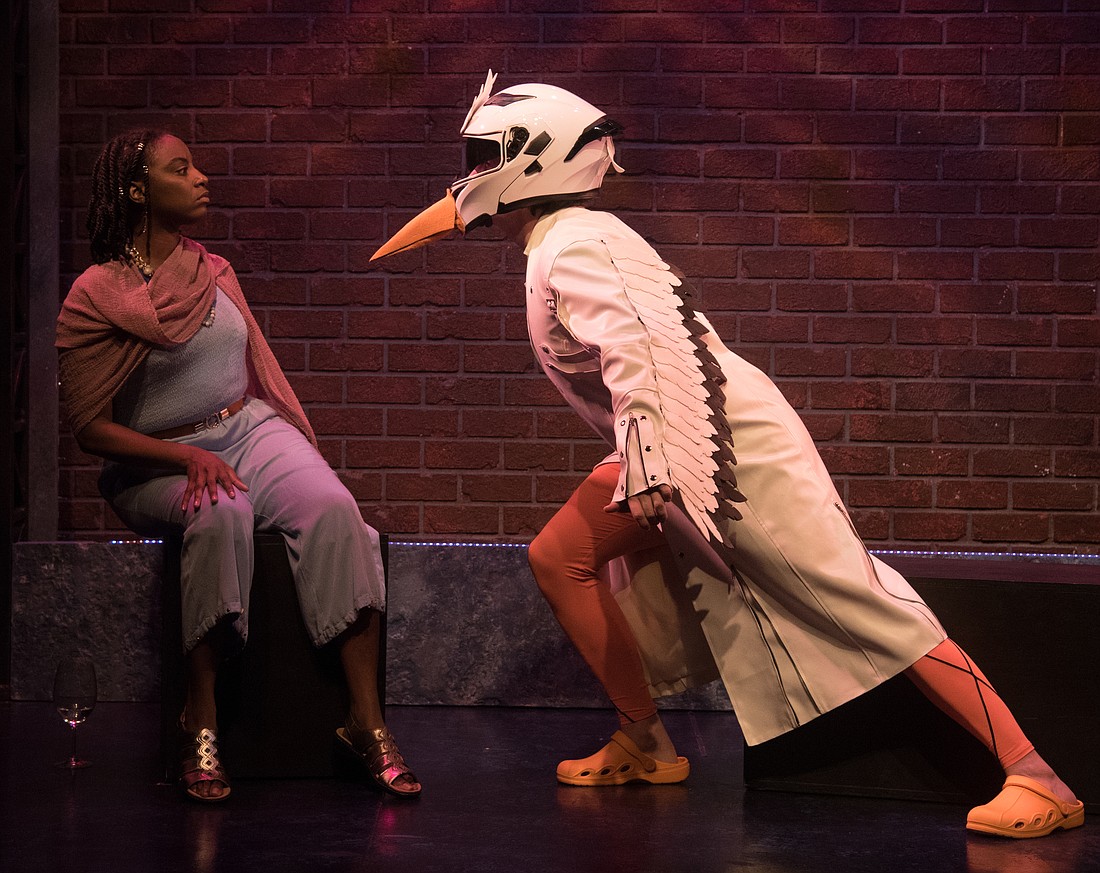- July 26, 2024
-
-
Loading

Loading

Bad news first: Climate change, war and famine have led to ecological disaster on a global scale. Millions of acres of land are either flooded or barren. Hundreds of millions of people died. Hundreds of millions of survivors were forced to migrate.
To ensure humanity’s continued survival, a global government has launched a program of genetic engineering. For a child to be legal, each fetus’ DNA must be “pre-certified” in the mother’s womb. Abortion culls most failing fetuses. As a result, the genes for autism and predispositions for various diseases have been largely weeded out — along with the genes with a risk for violence and anti-social behavior. To enforce this edict, illegal offspring are all exiled. The good news? It hasn’t happened yet. It’s the premise of Jacqueline Goldfinger’s funny, terrifying, gutsy “Babel.” Her dark future is the latest FST Stage III production.
The playwright doesn’t offload this disturbing scenario in one big exposition dump. It stays in the background and emerges in the references and expressions of casual speech. The action revolves around a same-sex couple: Renee (Anique Clements) and Ann (Lucy Lavely). They’re friends with another couple — Dani (Rachel Moulton) and Jamie (Tom Patterson). At first, they just hang out and talk. Everyone’s happy, because Renee’s expecting. Details about Renee’s upcoming “blessed event” is shared as it always has been.
Ah, but something’s a wee bit off. What should be a normal chat becomes a walk through a verbal minefield. The wrong word or question — then it suddenly gets tense. Why? You find out the couple’s new baby wasn’t “pre-certified.” Then you find out that’s a very big deal. And then you find out why.

A doctor thinks the fetus’ DNA (taken from both Ann and Renee, then merged into a single fertilized egg) might be loaded dice. He didn’t sign off on their new arrival. Without his signature, Renee has two choices. Abort the fetus — or give birth to a child who’ll be whisked away for life as a second-class citizen in “the Villages.” Ann brushes the dilemma aside. She thinks there’s a third choice: Make the doctor sign. Ann is a top-tier marketer. Persuasion is her job, and she’s good at it. Ann breaks through sales-resistance every day. Get the doc’s signature? No prob. It’s just another sale.
While “Babel” is sci fi, its conflict is fairly straightforward — with one surreal exception. Renee is constantly visited by a foul-mouthed, anthropomorphic stork that tries to convince her to abort. This big, bad bird is a hallucination: nobody else can see it. The stork is in Renee’s head for two possible reasons — both bad. Either she’s going nuts. Or somebody put it in there.
Goldfinger’s dialogue is excellent. People repeat themselves, interrupt each other and talk at the same time like characters in an Altman movie. When actors speak her lines, it sounds like speech, not a script. I love it.
Catherine Randazzo honors the playwright’s naturalistic randomness. Behind the talk, the underlying story is speculative fiction. But she directs it like any other relationship dilemma — not sci fi. Which is why it works.
Clements’ Renee is a multitude of contradictions. She wants to be a mother. She also knows she’s being used. Her partner’s filled with lovey-dovey talk — but it feels manipulative. Ann treats her like a baby-making machine, and Renee doesn’t like it. But she still wants a baby. Kudos to Clements for a nuanced characterization. But Lavely’s Ann has zero contradictions. She’s used to getting exactly what she wants. She’s driven, sharp, and to the point. You figure she’ll never take “No” for an answer — even if it’s the only answer.
Patterson’s Jamie and Moulton’s Dani both seem relaxed and open. But it’s an act. Behind this front, their characters are having problems of their own. Jami and Danio also want a baby — but they’re hitting some undefined, dystopian wall. Their fake spontaneity keeps it hidden. Patterson and Dani deftly convey two characters constantly wrestling with thoughts they can’t speak.
Bruce Price and Alex E. Price’s set evokes the clean, well-lit spaces of minimalist future. Black cubes, white walls. An Ikea vision of dystopia. On the other hand, Mari Taylor Floyd’s costumes don’t look futuristic at all. No unitards or wide shoulder pads. Fashion hasn’t changed much since in the last three decades. Evidently, it won’t change in the next three. All this comes to life with Nadirah T. Harper’s lighting and Louis Vetter Torres sound design. No scary shocks to eyes and ears. It’s more like an angry iPhone chirping in the next room. Just a nagging subliminal creepiness that gets under your skin.
“Babel” isn’t a happy-happy romp. Like a good “Black Mirror” episode, it’s disturbingly unpredictable — and keeps you constantly off-balance. Goldfinger’s play is also smart. “Babel” is pregnant with ideas. It’s not virgin territory, of course.
Aldous Huxley’s “Brave New World” and Andrew Niccol’s “GATTACA” explored similar themes. They’re just two examples from a very long list. OK, so Goldfinger didn’t get here first. But she blazes a fresh, new trail through this dark territory. And like all good sci fi, her futuristic tale is really about the present.
“Babel” shines a light on the harsh choices facing humanity if we continue to trash the planet. It simultaneously illuminates our schizoid attitudes on parenthood, pregnancy, childbirth, and who gets to decide what. “Babel” also confronts the belief that science can make people better. (Goldfinger clearly doesn’t hold to that notion.) Playing God is not humanity’s strongpoint. When some folks tried in the past, the results were invariably horrific. “Babel” paints a bleak picture of future eugenics horrors. On the bright side, “Renee” means “reborn.” The playwright still hints of hope.
Goldfinger does all that. And she does it well.
That ain’t easy, folks.
SF is a tough genre for storytellers. Making a speculative story work on stage is even tougher. Brava and bravo to Goldfinger and FST’s talents for making it happen.
I hope to see more in the future.